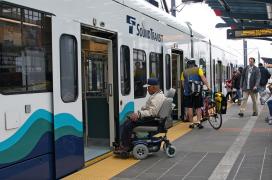FTA Announces Certification of the State Safety Oversight Programs for North Carolina, Puerto Rico and Washington Ahead of Important Deadline
7/10/2018
States must receive FTA certification by April 15, 2019 or new federal transit funds cannot be awarded
WASHINGTON – The U.S. Department of Transportation’s Federal Transit Administration (FTA) today announced that North Carolina, Puerto Rico and Washington have obtained federal certification of their rail transit State Safety Oversight (SSO) Programs, in advance of an important safety deadline.
Federal law requires states with rail transit systems to obtain FTA certification of their SSO Programs by April 15, 2019. By federal law, the deadline cannot be waived or extended.
"FTA is pleased that North Carolina, Puerto Rico and Washington have developed safety oversight programs that meet federal certification requirements and will strengthen rail transit safety," said FTA Acting Administrator K. Jane Williams. "With this certification, transit agencies in the three jurisdictions can continue to receive federal funding."
The North Carolina Department of Transportation is responsible for providing safety oversight of the Charlotte Area Transit System light rail and streetcar systems.
The Puerto Rico Emergency and Disaster Management Bureau is responsible for providing safety oversight of the Tren Urbano heavy rail system.
The Washington State Department of Transportation is responsible for providing safety oversight of the Sound Transit light rail systems and City of Seattle street car and monorail systems.
By April 15, 2019, 30 states must obtain certification of 31 SSO Programs. With today’s announcement, 17 states have now achieved SSO Program certification.
If a state fails to meet the deadline, FTA is prohibited by law from awarding any new federal transit funds to transit agencies within the state until certification is achieved. A certification status table by state is available online.
To achieve FTA certification, an SSO Program must meet several federal statutory requirements, including establishing an SSO agency that is financially and legally independent from the rail transit agencies it oversees. In addition, a state must ensure that its SSO agency adopts and enforces relevant federal and state safety laws, has investigatory authority, and has appropriate financial and human resources for the number, size and complexity of the rail transit systems within the state’s jurisdiction. Furthermore, SSO agency personnel responsible for performing safety oversight activities must be appropriately trained.
###

